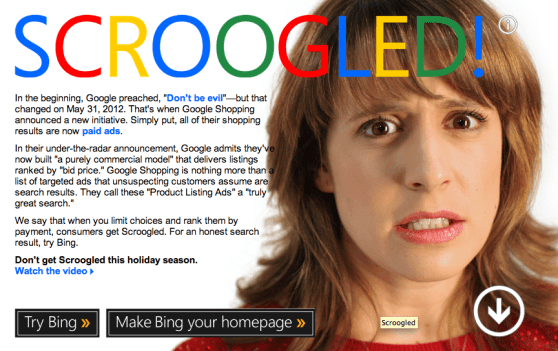testsetset
With Bing largely failing to undercut Google’s marketshare, Microsoft is now looking to undercut something else: Google’s credibility.
To that end, Microsoft is launching”Scroggled”, its latest attack on Google’s search dominance and proof that it’s not above fighting dirty .
“Can you spot the ads in the Google Shopping search results? It’s easy: They are all ads,” Microsoft says in the Scoogled campaign video.
June 5th: The AI Audit in NYC
Join us next week in NYC to engage with top executive leaders, delving into strategies for auditing AI models to ensure fairness, optimal performance, and ethical compliance across diverse organizations. Secure your attendance for this exclusive invite-only event.
Microsoft’s claim is this: Because Google Shopping’s search results are determined by how much companies are willing to pay for them, they’re unavoidably inaccurate. “They Scroogle you by defining relevance by how much they’re getting paid,” Microsoft says.
Predictably, Microsoft’s solution to the problem is to use Bing, which promises a more honest search. “We won’t let who pays us for ads or other services affect what you see in your search results. Search results are one thing; ads are another,” Bing VP Mike Nichols said on the Bing blog.
While the campaign is effective and impeccably-timed, it fails to address one major reality: The core Bing search product is still pretty bad. Bing has been my default browser for a few months now (for Science!) but I find myself almost always reverting to Google when Bing fails to give me useful results. That’s not the way a search engine should work.
So for Microsoft, the path forward is clear: Focus less on Google and more on Bing.


